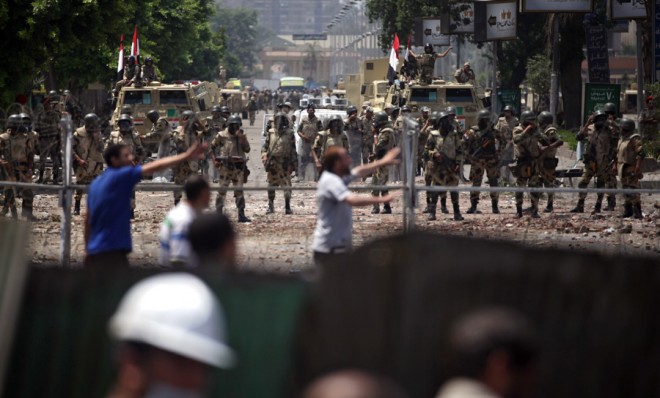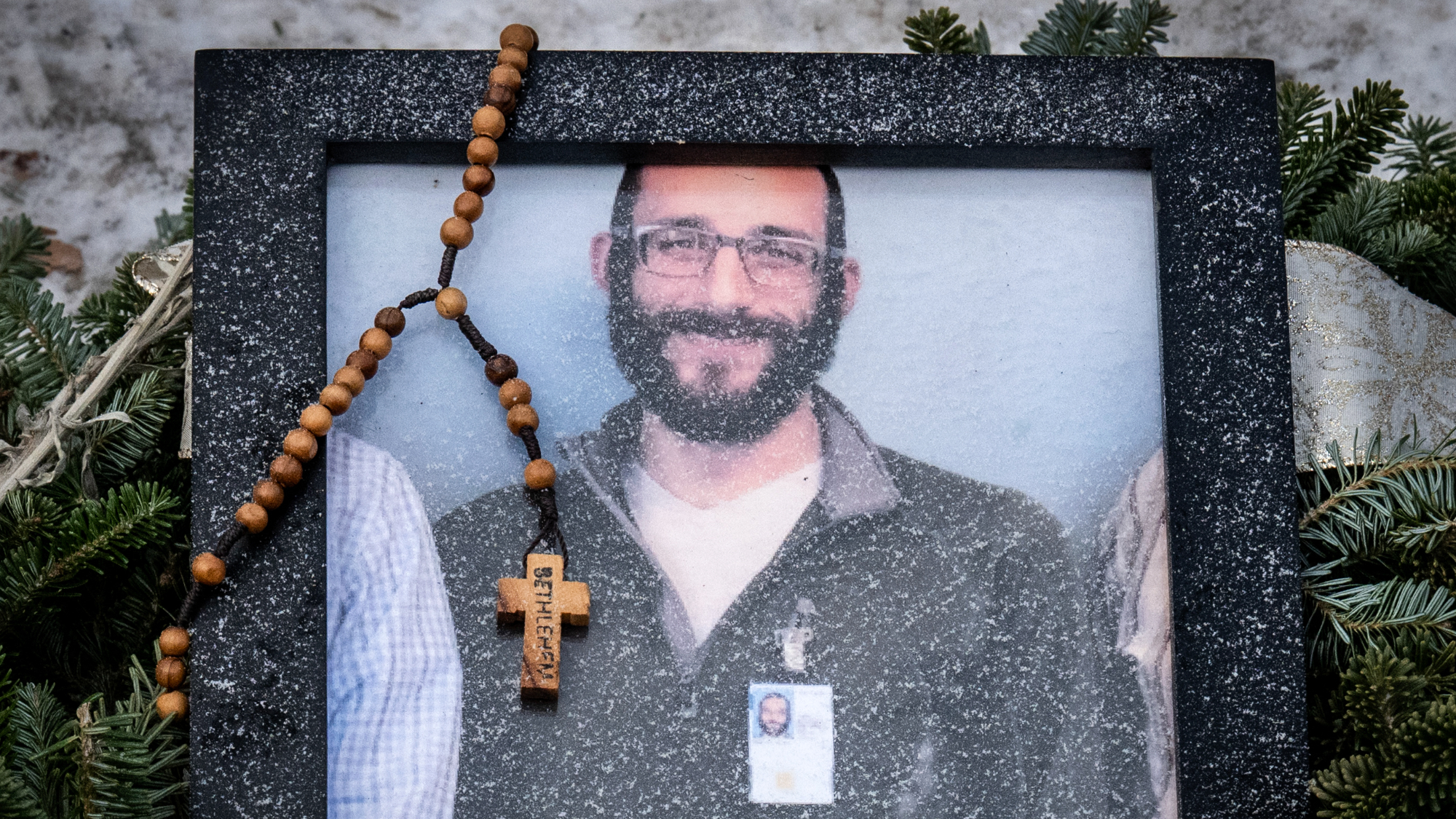Dispatch from Cairo: Egypt is on the brink of civil war
Terrifying bouts of violence have broken out in the streets of this roiling Mideast country

CAIRO, EGYPT — Over the past week, a popular uprising against a divisive, inept, Islamist president turned into the military takeover of Egypt. While the military is promising to stay out of politics, this seems to be contradicted by a couple clear truths: The military's traditional domination of Egyptian society, and its recent takeover, which is being militantly opposed by Islamist activists.
The fact that the military has the overwhelming support of liberals and leftists who just two years ago were chanting "down with military rule" shows how adept the Egyptian military is at co-opting genuine popular movements to advance its agenda. This phenomena is nothing new, and it is one of the reasons Egyptian society is so hard to reform.
This morning, things went from bad to worse at an Islamist, anti-military protest outside the Republican Guard Headquarters. It is unclear who shot first, but around dawn a firefight erupted between the two sides. Dozens of protesters ended up dead, many with shots to the head. Hundreds were injured. The security forces, for their part, report 42 injuries and 1 death.
The Week
Escape your echo chamber. Get the facts behind the news, plus analysis from multiple perspectives.

Sign up for The Week's Free Newsletters
From our morning news briefing to a weekly Good News Newsletter, get the best of The Week delivered directly to your inbox.
From our morning news briefing to a weekly Good News Newsletter, get the best of The Week delivered directly to your inbox.
This bloodbath underlines the fact that the military's overthrow of President Morsi, far from stabilizing Egypt, will further polarize the nation and lead to unprecedented bloodshed.
The Egyptian military has long dominated politics and has been responsible for its fair share of human rights abuses. A military coup overthrew the monarchy in 1952, and since then every Egyptian premier until Morsi had his roots in the armed forces. Besides wielding political influence, military leaders wield considerable economic power, both personally and through state-owned enterprises.
The Arab Spring revolution was in large part organized against the domination of Egyptian life by the military. It should come as no surprise that the military was anxious to put an end to the democratic experiment in Egypt.
What is more perplexing is how the vast majority of Egyptian liberals, including many who supported the original 2011 revolution and some who lost comrades to previous military crackdowns, are now cheering the takeover.
A free daily email with the biggest news stories of the day – and the best features from TheWeek.com
Yesterday, I stood on Mohamad Mahmoud Street, right on the corner of Tahrir Square, among jubilant, cheering crowds as military jets flew low overhead. Many people were holding pictures of General Sisi, the head of the Supreme Council of the Armed Forces (SCAF) and the man who effectively seized power last week. Less than two years ago, security forces acting under the direct orders of SCAF killed 47 protesters and wounded hundreds more on this very street.
Millions of people have poured out on the street to celebrate the military's latest actions. Some of them are certainly former supporters of the deposed dictatorship. However, many of the people now supporting military intervention, including nearly everyone I am friends with here, were active participants in the initial Arab Spring revolution. Bafflingly, they now praise the military establishment as being made up of selfless patriots who can't wait to give power back to the people.
This remarkable change of attitude is partly a testament to how divisive and ineffective Muslim Brotherhood leadership was. The protest movement that SCAF piggybacked onto was broad-based and genuine. The military has co-opted a genuine reform movement, hoping to stall change and preserve its extensive privileges.
Immediately after the 1952 coup against the monarchy, the ruling junta threw their lot in with a growing leftist Arab nationalist movement to garner legitimacy and consolidate power.
In the '70s, when the dictatorship was coming under fire for its neo-liberal reforms, corruption, and detente with Israel, Egypt's leaders turned on their leftist allies, repressing them and supporting the burgeoning Islamists.
When the Islamists became too powerful and radical, they too were imprisoned and exiled. However, given the Islamists' charitable works and cohesive organization, they were able to remain influential enough to win the first free elections in 2012, and while Morsi did nothing to challenge the military's dominance, many thought he was simply biding his time.
As it became clear over the past few months that a majority of Egyptians were desperate and fed up with Morsi's leadership, the military once again used one group of activists against another.
The Egyptian military has become increasingly rich and non-ideological since the '50s, and its leaders have never treated their allies very well. Egyptian liberals should remember this, especially since their core demands of economic reform, political liberalization, and justice for the revolutionary martyrs run directly counter to military interests.
If liberals once again come out in the street to protest against the military's vision of society, there is nothing to indicate that the military won't violently repress them, like they did a year and a half ago.
Furthermore, while supporters of the coup often justify it by saying Egypt couldn't suffer a few more months under an Islamist parliament, they underplay how disruptive and violent the aftermath of the coup will be. If Morsi lost his parliamentary majority as was expected, chances are the Brotherhood would have been appropriately humbled and would have peacefully gone back to the drawing board to prepare for the next elections.
Now, with Brotherhood offices on fire, their leadership under arrest, and their members in gunfights with security forces, it seems that Egypt is not only on the path back to autocracy, but also on the brink of civil war.
Jake Lippincott earned a degree in Middle Eastern Studies at Hampshire College. He worked in Tunis during the popular uprising there, and is now based in Cairo.
-
 Winter storm lashes much of US South, East Coast
Winter storm lashes much of US South, East CoastSpeed Read The storm spread across 2,000 miles of the country
-
 China’s Xi targets top general in growing purge
China’s Xi targets top general in growing purgeSpeed Read Zhang Youxia is being investigated over ‘grave violations’ of the law
-
 Demands for accountability mount in Alex Pretti killing
Demands for accountability mount in Alex Pretti killingSpeed Read Pretti was shot numerous times by an ICE agent in Minneapolis